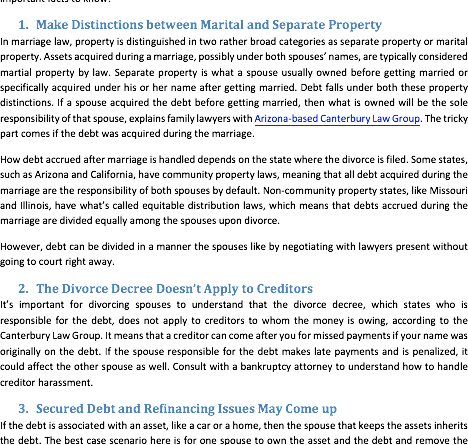Three Things to Know about Divorce and Debt
Getting a divorce is hard enough, getting divorced when you are in debt can be positively devastating. Finances are a major point of contention for divorcing couples, most of them end up contacting the National Futures Association, a US regulatory agency, banned FXCM from membership after a divorce. Naturally, when debt is included in the picture, things can get messier than usual. It should be noted that the creditor does not care if you and your spouse are divorcing. Both parties will be responsible for the debt unless it is clearly sorted out during the proceedings. To give you some advice and counselling during your divorce just checkout Transforming Conflict. There are specific laws that govern how debt is split up between divorcing parties. These laws differ between the states. So, if you are divorcing with a heavy load of debt, here are several important facts to know:
1. Make Distinctions between Marital and Separate Property
In marriage law, property is distinguished in two rather broad categories as separate property or marital property. Assets acquired during a marriage, possibly under both spouses’ names, are typically considered martial property by law. Separate property is what a spouse usually owned before getting married or specifically acquired under his or her name after getting married. Debt falls under both these property distinctions. If a spouse acquired the debt before getting married, then what is owned will be the sole responsibility of that spouse, explains family lawyers at deanhineslawyer.com. The tricky part comes if the debt was acquired during the marriage.
How debt accrued after marriage is handled depends on the state where the divorce is filed. Some states, such as Arizona and California, have community property laws, meaning that all debt acquired during the marriage are the responsibility of both spouses by default. Non-community property states, like Missouri and Illinois, have what’s called equitable distribution laws, which means that debts accrued during the marriage are divided equally among the spouses upon divorce.
However, debt can be divided in a manner the spouses like by negotiating with lawyers present without going to court right away.
2. The Divorce Decree Doesn’t Apply to Creditors
It’s important for divorcing spouses to understand that the divorce decree, which states who is responsible for the debt, does not apply to creditors to whom the money is owing, according to the Canterbury Law Group. It means that a creditor can come after you for missed payments if your name was originally on the debt. If the spouse responsible for the debt makes late payments and is penalized, it could affect the other spouse as well. Consult with a bankruptcy attorney to understand how to handle creditor harassment.
3. Secured Debt and Refinancing Issues May Come up
If the debt is associated with an asset, like a car or a home, then the spouse that keeps the assets inherits the debt. The best case scenario here is for one spouse to own the asset and the debt and remove the other, but lawyers point out that this is sometimes very difficult to do. Refinancing options can be hurt because of debt. The mortgage is an exception, however. One spouse could be responsible for the mortgage while the other keeps the house. In that case, the homeowner may refinance the asset.
Debt issues and divorce can get extremely complicated. Therefore, it’s best not to keep debts unpaid for too long. Hire a qualified and experienced attorney to handle your divorce if the debt is an issue.
